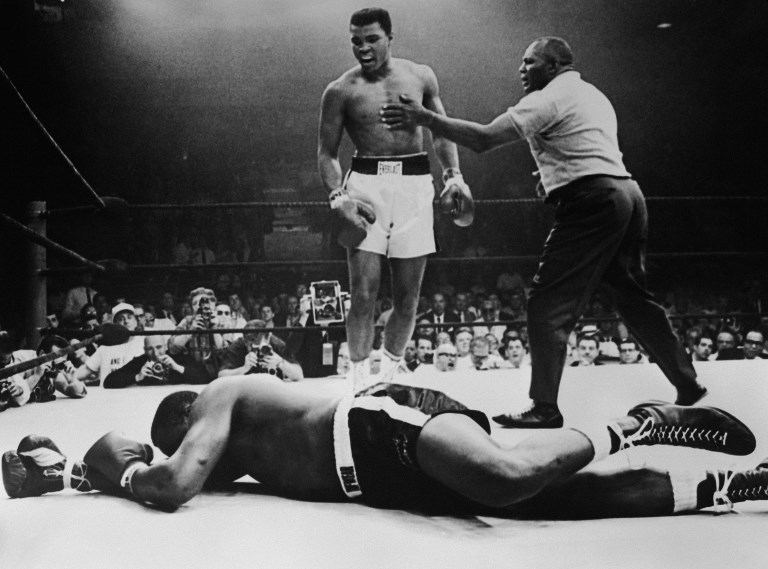Muhammad Ali, Foreman Among Top Five Olympic Boxers
30th November 2018
Cassius Clay is widely considered the greatest boxer of all time and perhaps the greatest sportsman ever

- Boxing is fighting for its Olympic future amid serious concerns over the governing body AIBA, threatening the participation of the sport at the Tokyo 2020 Games
- After a glittering career, Ali then returned to the Olympic stage at Atlanta in 1996, where his trembling lighting of the Olympic flame spotlighted his battle with Parkinson's and provided one of the most emotional moments in Olympic history
- After failing to win selection for the US team in 1972, Sugar Ray Leonard headed to Montreal in 1976 to take part in what has been hailed the greatest competition in Olympic history, packed with stars
- Foreman became famous for a stunning comeback from retirement, winning back the Heavyweight Championship at the age of 45
TOKYO, Japan- Boxing is fighting for its Olympic future amid serious concerns over the governing body AIBA, threatening the participation of the sport at the Tokyo 2020 Games.
The so-called "Sport of Kings" has a proud Olympic history and can chart its involvement back to the Ancient Games in 688 B.C.
Many giants of the sport began their careers as amateurs in the Olympic ring. AFP recalls five of the best:
Muhammad Ali: The Greatest
In 1960 in Rome, a relatively unknown lightweight 18-year-old called Cassius Clay made his Olympic debut. He would go on to become Muhammad Ali, widely considered the greatest boxer of all time -- and perhaps the greatest sportsman.
Clay didn't have it all his own way in his final against a southpaw from Poland, Zbigniew Pietrzykowski, who caused him difficulties in the early exchanges.
But the five judges eventually gave him an unanimous 5-0 decision, handing him a gold medal that the future World Heavyweight Champion wore "everywhere he went," according to biographer Jonathan Eig.
After a glittering career, Ali then returned to the Olympic stage at Atlanta in 1996, where his trembling lighting of the Olympic flame spotlighted his battle with Parkinson's and provided one of the most emotional moments in Olympic history.
'Fabulous' Sugar Ray Leonard
After failing to win selection for the US team in 1972, Sugar Ray Leonard headed to Montreal in 1976 to take part in what has been hailed the greatest competition in Olympic history, packed with stars.
In the end, the 21-year-old cruised through the tournament, winning every bout 5-0 and dispatching the mighty Cuban Andres Aldama in the gold medal bout, also by a 5-0 decision.
The 1976 gold medal served as a springboard for an impressive professional career that saw Leonard considered as one of the "fantastic four" that kept boxing popular after Ali's retirement.
In 1980, he would return to the same venue for a bout dubbed the "Brawl in Montreal", losing to "Hands of Stone" Roberto Duran from Panama.
'Big George' Foreman
American George Foreman arrived at the 1968 Games in Mexico City as a 19-year-old novice with only 18 bouts to his name.
He left a superstar of the sport, winning three out of four of his bouts by knock-out or stoppage, including stopping tough Soviet fighter Jonas Cepulis in the second round in the final.
Foreman turned professional immediately after the Games and within five years was World Heavyweight Champion after knocking out Joe Frazier, who had himself won gold in 1964.
He later became famous for a stunning comeback from retirement, winning back the Heavyweight Championship at the age of 45.
'Money' Mayweather
Floyd Mayweather will forever be known for the 2015 "Fight of the Century" against Filipino Manny Pacquiao -- the highest grossing bout of all time -- but his Olympic career was shrouded in controversy as he won only a bronze medal.
Mayweather fought as a precociously talented teenaged featherweight in the 1996 Atlanta Games and progressed to the semi-final against Bulgaria's Serafim Todorov.
The judges scored the fight 10-9 to Todorov, confounding even the referee who raised aloft Mayweather's arm, convinced the American had done enough to win.
The controversial decision sparked an official protest from the US team, which claimed Mayweather landed punches that were not counted. "I got ripped off," Mayweather was quoted as saying at the time.
Neon lights for Spinks
Leon "Neon" Spinks is best known for becoming World Heavyweight Champion after defeating Ali in 1978 in a split decision considered one of the sport's most controversial.
But he too cut his teeth in the Olympic ring, winning gold in Montreal in the light-heavyweight division while his brother Michael also picked up gold as a middleweight.
In the final, he pulled off what was seen as a shock result against the Cuban Sixto Soria and turned professional the year afterwards -- another fighter who launched his career via the Olympic ring.
